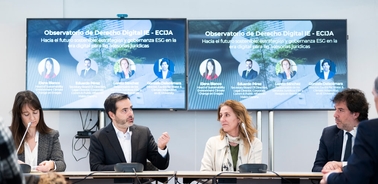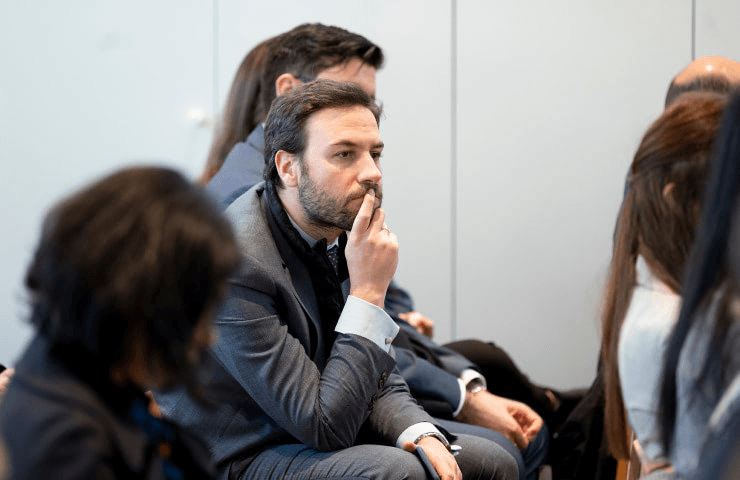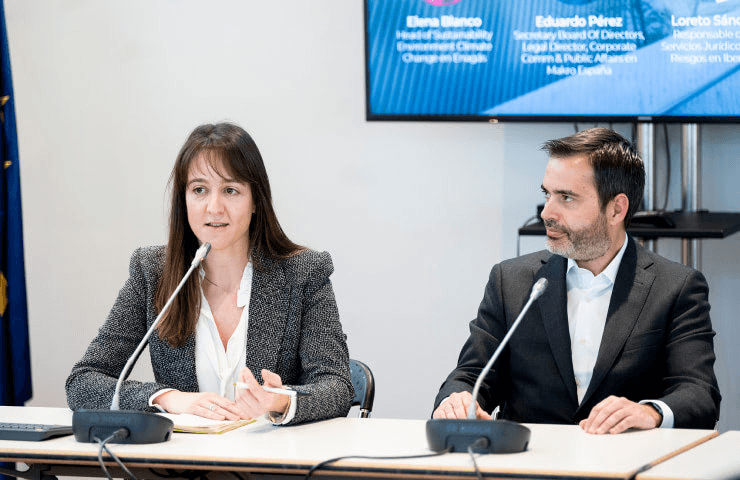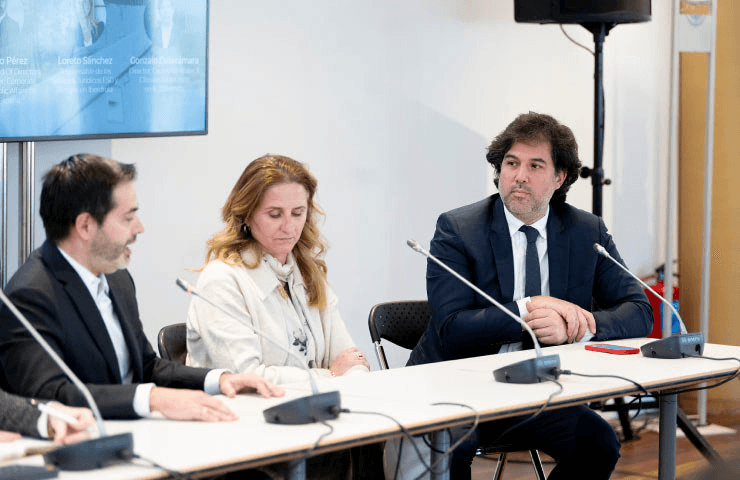- Home
- We Are Law School
- News
- Sustainability Report: Creating A Sustainable Future
Sustainability report: creating a sustainable future

IE-ECIJA Digital Law Observatory holds round table event attended by legal experts to present its latest report on ESG strategies and governance in the digital age.
To mark the release of the latest IE-ECIJA Digital Law Observatory Sustainability Report: Creating a Sustainable Future, IE Law School hosted a round table event on Thursday, February 8th. The talk brought together several experts on sustainability from a legal advisory standpoint, who provided an analysis of the key issues.
ECIJA Corporate Partner Alberto Alonso Ureba and Partner and Chief Sustainability Officer Víctor Moralo were tasked with presenting the report, compiled by the observatory’s newest focus group. The document sets out the concerns and challenges being faced by companies' in-house legal departments and presents a range of responses devised to tackle evolving needs in the field of sustainability.
Víctor Moralo emphasized the need for a rapid response to the detection of any environmental risk factors in the form of protocols, reactive measures and control procedures.
“Is sustainability sustainable? This new paradigm is both a challenge and an opportunity; it’s set to be a differential factor in how we do business.”
Víctor Mola, ECIJA Partner and Chief Sustainability Officer
Alberto Alonso reflected on how sustainability strategies are currently considered defense mechanisms, believing they should instead be viewed as an opportunity to create wealth for businesses. The crucial point in this new context will be companies’ ability to innovate in environmental terms, as well as to devise and protect these new intangible elements.
“The key is to manage regulatory issues quickly, transform governance departments and then establish transversal policies that are central to the corporate culture.”
Alberto Alonso Ureba, Corporate Partner at ECIJA
Following the presentation of the report, there was a round table moderated by Gonzalo Delacámara, director of IE University’s Center for Water and Climate Adaptation. Taking part were Loreto Sánchez, Head of Risk and ESG Legal Services at Iberdrola; Eduardo Pérez, Secretary of the Board of Directors, Legal Director, Corporate Comm & Public Affairs at Makro Spain; Elena Blanco, Head of Sustainability Environment Climate Change at Enagás.
Gonzalo Delacámara got the conversation underway by reflecting on the need for the European Union to strengthen its climate commitments in view of the 2030 Agenda and in order to meet its net zero emissions target by 2050. Of course, this must come while also ensuring the region remains competitive from an economic and production perspective.
The participants discussed their opinions and experiences in managing environmental regulations and explained how their respective companies are addressing existing challenges in this regard and forging a path into the future.
“At Iberdrola, we’ve managed to strike a balance between sustainability and profits. We have to establish our goals and be realistic, without neglecting the impact on our stakeholders or our financial targets.”
Loreto Sánchez, Head of Risk and ESG Legal Services at Iberdrola
“This new setting creates opportunities but it also comes with risks. We are in a complex economic dynamic, within the context of a hyper-regulated Europe.” Eduardo Pérez, Secretary of the Board of Directors, Legal Director, Corporate Comm & Public Affairs at Makro España.
Enagás’s Elena Blanco highlighted how coming into line with sustainability regulations should be considered a big opportunity to give companies a boost. It should be approached as a roadmap to genuinely implement sustainability at a strategic and operational level.
“Sustainability has never been about marketing and that is clear in the legislation. Everything related to the business must be reported, favorable or not.” Elena Blanco, Head of Sustainability Environment Climate Change at Enagás.
Gonzalo Delacámara pinpointed the commitment that must be undertaken by all types of organizations, from private companies to public bodies and educational entities, in this new global path towards sustainability. He highlighted the fact that IE University scooped a prize at the Responsible Business Education Awards 2024, presented on a yearly basis by the Financial Times, in recognition of its dedication to innovative educational practices and commitment to sustainability.
IE-ECIJA Digital Law Observatory
The IE-ECIJA Digital Law Observatory is a space set up by IE Law School to facilitate the analysis of and research into the impacts of the digital economy on the legal world. The advisory board is comprised of leading figures in the legal and technological fields, including the Dean of IE Law School, Soledad Atienza. Beyond sustainability, the other central topics studied in the observatory are cybersecurity, legaltech, artificial intelligence, the metaverse and the economy, as well as governance and data protection.


